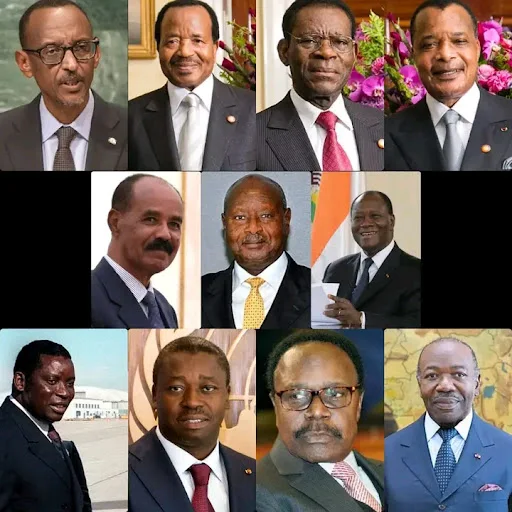Political editor, Abuja Network News.
Africa, a continent of immense potential, has long been plagued by a recurring theme in its political landscape – sit tight democracy. This concerning trend, characterized by leaders clinging to power for extended periods, has not only hindered the continent's progress but also undermined global best practices and constitutional principles. In this critique, we will explore the detrimental effects of Africa's sit tight democracy on development, particularly focusing on recent military coups in Sudan, Burkina Faso, Mali, Niger, and Gabon. Additionally, we will propose solutions that would pave the way for true democratic practices to flourish across the continent.
One cannot help but question why, in the name of democracy, 11 leaders collectively ruled African countries for a staggering total of 347 years. Leaders such as Paul Kagame, Paul Biya, Teodoro Mbasogo, Dennis Nguesso, Isias Afwerki, Yoweri Museveni, Alhassan Outtara, Gnassingbe Eyadema, Faure Eyadema, Omar Bongo, and Ali Bongo have become synonymous with sit tight democracy. This phenomenon not only hampers the democratic process but also stifles the growth and development of these nations.
Sit tight democracy is inherently incompatible with global best practices and the principles of good governance. Respect for term limits, frequent and fair elections, and the peaceful transition of power are essential facets of any thriving democracy. However, these fundamental pillars are often disregarded in African nations governed by sit tight leaders. This disregard perpetuates a vicious cycle of limited accountability, enabling corruption, and reducing faith in democratic institutions among citizens.
It is no coincidence that the continent of Africa, despite its abundant resources, struggles with underdevelopment and a recurrent wave of military coups. The entrenchment of sit tight democracy has led to frustration, inequality, and a sense of powerlessness among the people. This toxic environment creates fertile ground for coup d'états, as seen in recent events in Sudan, Burkina Faso, Mali, Niger, and Gabon.
Military coups are not only detrimental to stability but also thwart economic progress, undermine constitutional frameworks, and erode international confidence in affected nations. The political turmoil that follows such coups further exacerbates existing issues of poverty, inadequate infrastructure, and limited access to education and healthcare. Moreover, it undermines the continent's image on the global stage, hindering potential investments and partnerships crucial for sustainable development.
While the challenges posed by sit tight democracy and military coups are significant, there are steps that can be taken to promote true democracy and foster development across Africa:
1. Strengthen Constitutional Frameworks: African countries should establish robust constitutional frameworks that clearly define term limits, ensure the separation of powers, and emphasize the importance of regular and transparent elections.
2. Encourage Active Civil Society Participation: By actively engaging civil society organizations, governments can strengthen democratic institutions, promote transparency, and hold leaders accountable.
3. Prioritize Economic Development and Social Welfare: A focus on economic development, poverty eradication, quality education, and accessible healthcare will address socio-economic disparities, reducing the appeal of authoritarian rule.
4. Promote Regional Cooperation: Collaboration between African nations can encourage dialogue, promote democratic values, and establish mechanisms for mitigating conflicts, thus reducing the likelihood of military coups.
5. International Partnerships: The global community should support Africa's democratic aspirations by providing technical assistance, promoting capacity-building initiatives, and encouraging investments that prioritize good governance and sustainable development.
Africa's sit tight democracy, seen through the lens of leaders ruling for decades, poses a significant obstacle to the continent's development and adherence to global best practices. This trend not only undermines democratic principles but also contributes to underdevelopment and a recurrent cycle of military coups. By focusing on strengthening constitutional frameworks, encouraging civil society participation, prioritizing socio-economic welfare, promoting regional cooperation, and fostering international partnerships, Africa can transition towards true democracy. It is only through such transformative efforts that the continent can unlock its vast potential, achieve sustainable development, and emerge as a beacon of progress on the global stage.
Tags
Editorial

